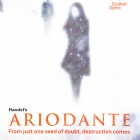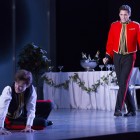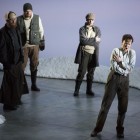Ariodante 2016Scottish Opera
Read more about the opera Ariodante
After a brief appearance at the Edinburgh International Festival, with an enjoyable concert performance of H M S Pinafore, Scottish Opera's 2015-16 season proper began with a revival of the staging of Carmen by Patrice Caurier and Moshe Leiser. This was first put on by Welsh National Opera, and was mounted by Scottish Opera in 1999. This ran in tandem with a new small-scale tour of Così fan tutte. In the New Year the premiere of a new work by Stuart MacRae, The Devil Inside, was followed by three further operas being given by the company for the first time - Ariodante, Rusalka and The Mikado.
Is Ariodante Handel's greatest opera? No sorcery, no need for spectacular effects, but a simple human story where an evil character nearly brings about a tragedy of misunderstanding. It's a straightforward plot, used by Shakespeare as his source for the serious bits of Much Ado. Ariosto set his original story in the distant and exotic north, i.e. Scotland. Shakespeare relocates it to the more obviously hot-blooded climate of Sicily. Harry Fehr, however, finds a convincing way to present it in a vaguely Scottish context. One wintry scene, apparently at Duddingston Loch, led to the idea that Rev Robert Walker might skate past at any moment.
This cast is superb, with Caitlin Hulcup following her success in the company's excellent recent production of Gluck's Orfeo. She tackles her succession of challenging arias with bravura and, as with that Orfeo, is physically convincing in the role of a young man in emotional tatters. Sarah Tynan, as Ginevra, has brief moments of joy and therefore elaborate display at the outset, but most of her music is deeply tragic, and she gives a wonderful display of profoundly emotional singing. Jennifer France, with a soprano of equal, though distinct, quality - is a new arrival of great promise. Ed Lyon, the Lurcanio, makes this character dramatically plausible in his near-constant confusion, and also sings well. Xavier Sabata, a counter-tenor villain, also makes much of the Iago-like character of Polinesso. The most familiar performer, Neal Davies, seemed powerful casting for the brief role of the King, but he has a couple of beautiful sequences as he condemns, then consoles, his supposedly erring daughter. Even the small part of Odoardo is given more prominence in this interpretation of the piece. The dozen choristers are excellent and the accomplished band is beautifully conducted by renowned veteran baroque expert Nicholas Kraemer, also making his company debut.
Harry Fehr's thought-provoking take on Orlando still lingers in the memory, and this equals it in taking a completely fresh look at a piece. If Shakespeare has been an influence it is perhaps less to do with Much Ado and rather more the ideas from Measure For Measure. The designs by Yannis Thavoris are not specifically Scottish. However they provide a suitably chilly backdrop to this forbiddingly autocratic and fundamentalist society. The dance interludes provided in 1735 for Marie Sallé's company are here used, intriguingly, to underline dreams and nightmares, usually with Ginevra at their heart.
The costumes indicate a period vaguely of the 1930s, but as the curtain rises at the solemn start of the overture we see the cast observing an execution. Two newly-despatched corpses dangle from a scaffold. The curtain falls, and as the jollier allegro follows we read a projection of some lurid lines from Deuteronomy about the punishment for adultery. This is, of course, the King James translation, and provides an appropriately serious start to an earnest drama on the subject of illicit fornication. If there was one inconsistency in all this it was that Polinesso didn't seem to realise that being equally guilty, at least as far as the Old Testament was concerned, he should have been destined for the same fate as Ginevra.
The musical treatment was interesting. Taking the view that the first of the three acts was too relentlessly cheerful, with the evil plot ill-motivated, the production team turned to some passages of the original text by Salvi that had been cut by Handel's anonymous librettist. These gave some useful explanation of plot, and, as newly-composed by Derek Clark, sounded indistinguishable, to these ears, from the original Handel. In the event, the opera was redivided into two acts, so the machinations of Polinesso took effect, and we had Ariodante's great lament and Polinesso's 'Credo' before the single interval. This was an altogether satisfying change, which, at the third performance, provided a thoroughly absorbing evening.











